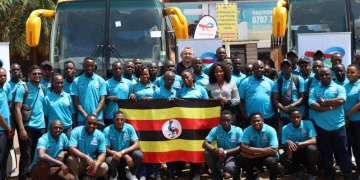 KAMPALA, Uganda — Faith-based nonprofit Pilgrim Africa is facing accusations of diverting donor funds, intended for health and humanitarian programs in Uganda, toward political activities. A lawsuit filed in Uganda alleges the organization misused funds earmarked for initiatives like malaria control for unauthorized and politically motivated expenditures.
KAMPALA, Uganda — Faith-based nonprofit Pilgrim Africa is facing accusations of diverting donor funds, intended for health and humanitarian programs in Uganda, toward political activities. A lawsuit filed in Uganda alleges the organization misused funds earmarked for initiatives like malaria control for unauthorized and politically motivated expenditures.
The legal complaint, filed in Uganda’s High Court, reference MC-14-2025, claims Pilgrim Africa bypassed crucial oversight bodies, including local government and health officials, in significant financial transactions. Lawyers for the plaintiffs assert that substantial donor money was unlawfully redirected, violating Uganda’s NGO Act and potentially anti-corruption and penal code statutes.
Local leaders and civil society groups have also raised concerns that projects branded as “community outreach” were, in reality, politically motivated mobilization efforts lacking proper permits. These groups have petitioned international donors, such as the Bill & Melinda Gates Foundation and the President’s Malaria Initiative, to suspend funding and conduct a forensic audit into Pilgrim Africa’s finances.
The petitioners allege that millions of dollars in grants have not yielded the expected health outcomes and that financial records are opaque, suggesting potential ghost procurement, inflated payments, and personal enrichment.
Because Pilgrim Africa is also registered in the United States, the alleged misuse of American donor funds could lead to legal repercussions, including the revocation of its tax-exempt status and potential federal prosecution under laws like the Foreign Corrupt Practices Act.
The accusations have sparked anger in the Teso and Karamoja sub-regions of Uganda, where Pilgrim Africa has historically operated. Residents say they feel betrayed, claiming that promised health services were replaced by political activities and unexplained spending.
Uganda’s Inspectorate of Government and the Financial Intelligence Authority have reportedly launched their own investigations into the nonprofit’s financial dealings. The unfolding scandal threatens to severely damage Pilgrim Africa’s reputation and raises broader questions about the accountability of NGOs operating in the region.
With the country gearing up for the 2026 elections, the Ministry of Internal Affairs recently warned Non-Governmental Organisations (NGOs) to desist from taking on donor funds with stringent conditions that may lead them to engage in partisan politics.
According to the Internal Affairs Ministry, many NGOs ceased operations in Uganda after the 2021 elections, with some being suspended by the government.
Mr Stephen Okello, the Executive Director of the NGO Bureau said that during the verification exercise conducted in 2019, Uganda had 14,207 NGOs operating in the country but after the elections, they dropped to 6,000.
“Organisations know very well that they are not supposed to engage in partisan politics, where they front or sponsor a particular candidate,’’ Mr Okello said.
Adding on: “We encourage NGOs to become self-sustaining by utilising Section 46 of the NGO Act, which allows them to raise funds locally. NGOs should not rely solely on foreign donations, as over 98 percent currently depend on them.”
Mr Okello also revealed that “NGOs that were closed for various reasons are not permitted to continue operations.”
In 2021, President Museveni suspended the activities of Democratic Governance Facility (DGF), accusing it of operating a huge fund without proper government oversight.
The same year, the government, through the NGO bureau, cracked the whip on at least 54 NGOs by suspending their operations.
Regarding faith-based organisations, Mr Okello said all religious activities must register as NGOs. He, however, added the government is developing a policy to address issues affecting such organisations.
In an interview with this publication, Mr Nicholas Opiyo, a human rights lawyer said the suggestion that the number of registered NGOs has dropped mainly because of declining donor funds is misleading and disingenuous.
“It is the State, through its agencies, that has closed domestic funding channels such as the Democratic Governance Facility, shut down NGOs, fabricated charges against sector leaders and their organisations, frozen bank accounts and expelled foreign workers in the NGO space,” he said.










Discussion about this post